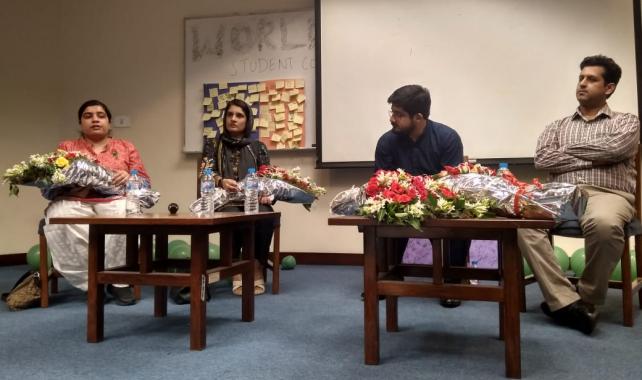
LUMS paves the way forward to highlighting global mental health concerns. On World Mental Health Day, a panel talk was held to discuss and educate the student body to address mental illness.
“Conversations about Mental Health on Campus” was a panel talk organised by the joint efforts of student organisations namely, LUMS Student Council, LUMS Model United Nations, and Psychology at LUMS on Wednesday, October 10, 2018. The event brought a full house of not only students, but also LUMS Faculty and Administration.
Featuring four speakers, the panel touched on very pertinent topics surrounding concerns on mental health at the campus setting. Those leading the discussion were Dr. Faizi Ali, Assistant Professor at the LUMS Business School, who discussed the dynamics of the student-teacher relationship and how the classroom, and by extension the entire educational institution, should be a space that acknowledges and accommodates mental health issues as legitimate, and should not be a place that exacerbates or neglects the mental health issues that students may face.
Ms. Aimen Bucha, Programme Manager at LUMS Saida Waheed Gender Initiative, spoke extensively about how the individualism of neo-liberalism has developed at the cost of interpersonal networks that are integral in maintaining one’s mental health. She also encouraged students to be open and unapologetic about their concerns for mental health. Mr. Ali Shabbar, based in Islamabad, is the only bridge trainer on the Convention of the Rights of Disabled Persons in South Asia, and a Programme Manager at STEP (Special Talent Exchange Program) a cross disability organisation. He spoke about the how institutions in Pakistan, including LUMS, need to be more accessible to those with not only physical disabilities, but psycho-social disabilities as well.
Mr. Abeer Mustafa, a LUMS alumnus deeply involved in tackling mental health issues in our community, initiated dialogue about what services are needed on campus for students and how we can create a more productive conversation on the matter. The talk brought about bigger, and more proactive conversation about mental health at LUMS, and what students, staff, and faculty can do to accommodate and possibly abate mental health concerns.
LUMS offered student body to consult an on-campus counselor or see an off-campus therapist, and encouraged to help people around suffering from mental illnesses and like diseases.








